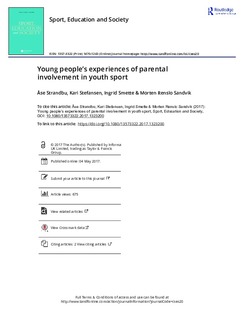| dc.contributor.author | Strandbu, Åse | |
| dc.contributor.author | Stefansen, Kari | |
| dc.contributor.author | Smette, Ingrid | |
| dc.contributor.author | Sandvik, Morten Renslo | |
| dc.date.accessioned | 2018-05-23T08:55:26Z | |
| dc.date.available | 2018-05-23T08:55:26Z | |
| dc.date.created | 2017-05-04T12:19:56Z | |
| dc.date.issued | 2017 | |
| dc.identifier.citation | Sport, Education and Society. 2017, under utgivelse. | |
| dc.identifier.issn | 1357-3322 | |
| dc.identifier.uri | http://hdl.handle.net/11250/2498824 | |
| dc.description | This is an Open Access article distributed under the terms of the Creative Commons Attribution-NonCommercial-NoDerivatives License (http://creativecommons.org/licenses/by-nc-nd/4.0/), which permits non-commercial re-use, distribution, and reproduction in any medium, provided the original work is properly cited, and is not altered, transformed, or built upon in any way. | |
| dc.description.abstract | Recently parental involvement in youth sport has intensified, challenging the understanding of youth sports as an arena where adolescents can develop their identity and autonomy. On this background, our study explores how adolescents understand and negotiate their parents’ involvement in sport and how they define ideal and undesirable forms of parental involvement. Our empirical setting is Norway, and we draw on data from 16 focus group interviews among 13–14-year-olds (n = 92) recruited from two lower secondary schools. The analysis shows that young people distinguish between different aspects of the sport activity when defining ideal and undesirable forms of parental involvement. When discussing sport as a healthy activity necessary for physical and social development, the young people interviewed approve of parents’ role in regulating and encouraging participation. When considering the athletic aspects and peer sociability, however, they see parental involvement as mostly undesirable. The analysis also shows that the adolescents generally describe their parents as attentive to the boundaries their children draw for them about levels and types of involvement. Therefore, young people should be seen not only as subjected to parental involvement but also as active co-constructors of valid parental roles in and beyond the sporting arena. | |
| dc.language.iso | eng | |
| dc.title | Young people’s experiences of parental involvement in youth sport | |
| dc.type | Peer reviewed | |
| dc.type | Journal article | |
| dc.description.version | publishedVersion | |
| dc.rights.holder | © 2017 The Author(s). | |
| dc.source.pagenumber | 12 | |
| dc.source.journal | Sport, Education and Society | |
| dc.identifier.doi | 10.1080/13573322.2017.1323200 | |
| dc.identifier.cristin | 1468137 | |
| dc.description.localcode | Seksjon for kroppsøving og pedagogikk / Department of Physical Education | |
| cristin.unitcode | 150,33,0,0 | |
| cristin.unitname | Seksjon for kultur og samfunn | |
| cristin.ispublished | true | |
| cristin.fulltext | original | |
| cristin.qualitycode | 2 | |
